|
Juliette's History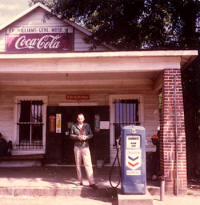
The town of
Juliette was first called Glover, after Dr. Glover who built the cotton mill
near the river in East Juliette. The towns of Iceburg and Brownsville had
sprung up earlier, but disappeared as Juliette began to grow along with the
coming of the East Tennessee, Virginia and Georgia railroad in 1882. Being
split by the Ocmulgee River, the town of Juliette is in Monroe County and East
Juliette is in Jones County.
Juliette
received its name from the daughter of the engineer that was building the
railroad. His daughter was Juliette McCrackin. McCrackin Street is still the
name of the main street running through Juliette today.
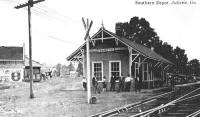 The depot was built soon after the railroad came through around
1882. A great amount of shipping business passed through the depot
for many years from the mill and local cotton growers. The depot was built soon after the railroad came through around
1882. A great amount of shipping business passed through the depot
for many years from the mill and local cotton growers.
The first Juliette school was built near the existing Juliette Methodist Church
around 1900, but it burned in 1907. It was rebuilt and still stands today. The
school was closed about 1943 and from that time on, the local kids rode the
buses to Forsyth. East Juliette had its own school that ran through the 9th
grade, complete with a gymnasium. After the ninth grade, children went to
school in Gray, which is the county seat of Jones County.
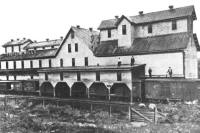 Joe Smith was the first to bring "big" industry to the area. He built the
famous
Juliette Milling Company Gristmill. About the same time, Dr. Glover
built the cotton mill across the river from the gristmill. Both were water
powered from the river. Around 1900, Dr. Glover bought the gristmill from Joe
Smith's sons, J.W. and Isaac, and consolidated the two businesses under one
name, Juliette Milling Co. Joe Smith was the first to bring "big" industry to the area. He built the
famous
Juliette Milling Company Gristmill. About the same time, Dr. Glover
built the cotton mill across the river from the gristmill. Both were water
powered from the river. Around 1900, Dr. Glover bought the gristmill from Joe
Smith's sons, J.W. and Isaac, and consolidated the two businesses under one
name, Juliette Milling Co.
The old gristmill was torn down in 1904 and a new one was built. But in 1926
the wooden gristmill burned and was then replaced in 1927 by the present
concrete structure. It was the world's largest water powered gristmill at the
time. The wooden dam that was first built was replaced by the current concrete
structure in 1921. In 1907 the
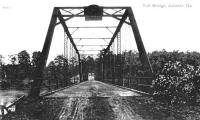 Milling Company built the first bridge across
the river, which was the only bridge over the Ocmulgee River for many miles. It
was only wide enough for one lane of traffic and the fee was a nickel for
walking and ten cents for a wagon or automobile. The old bridge was a toll
bridge until 1942. It was replaced by the new bridge in the 1971. The old
bridge was sold and moved to Taylor County. Milling Company built the first bridge across
the river, which was the only bridge over the Ocmulgee River for many miles. It
was only wide enough for one lane of traffic and the fee was a nickel for
walking and ten cents for a wagon or automobile. The old bridge was a toll
bridge until 1942. It was replaced by the new bridge in the 1971. The old
bridge was sold and moved to Taylor County.
The bustling main street, the hissing engines at the train station, the grinding
of the old gristmill, and the cranking and rattling of the planks on the old
bridge were all familiar sounds of a thriving Juliette. The Industries began to
decline though in the 50's, and inevitably, the community along with it. The
gristmill leased its operation to Dixie Lilly Milling Company, and then to
Martha White Mills, and ceased all operations in 1957.
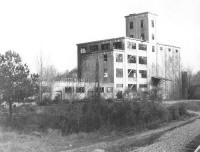 One by one, the merchants closed their stores. The only existing grocery store
today is Marvin Bowdoin's at the crossroads west of downtown Juliette on Highway
87. But for many people who grew up in or near Juliette, the town has a special
place in their hearts. Those memories of the quiet little town - - the sounds
of the train whistles, the clanking of the bridge, the roar of the water falling
over the dam, the sounds of frogs and crickets, the baseball games, and the
swimming holes - - will live on in their hearts. One by one, the merchants closed their stores. The only existing grocery store
today is Marvin Bowdoin's at the crossroads west of downtown Juliette on Highway
87. But for many people who grew up in or near Juliette, the town has a special
place in their hearts. Those memories of the quiet little town - - the sounds
of the train whistles, the clanking of the bridge, the roar of the water falling
over the dam, the sounds of frogs and crickets, the baseball games, and the
swimming holes - - will live on in their hearts.
With the help of the movie Fried Green Tomatoes, filmed in 1991,
and the dedication of a few individuals determined to bring Juliette back, let's
hope that these memories never fade away, but exist for many generations to
come. |
|
Did you know? |
|
A 20 page book on the
town's history is available for
purchase. It covers the origin of
the town as well as the history of the
mill, depot, schoolhouse and of course
the Whistle Stop Cafe.
There's also a photos section show the
town and the people from the 1890s
through the 1960s.
The History of Juliette is available
online for purchase or pick up your copy
at
The Juliette Expresso for $3.99! |
|